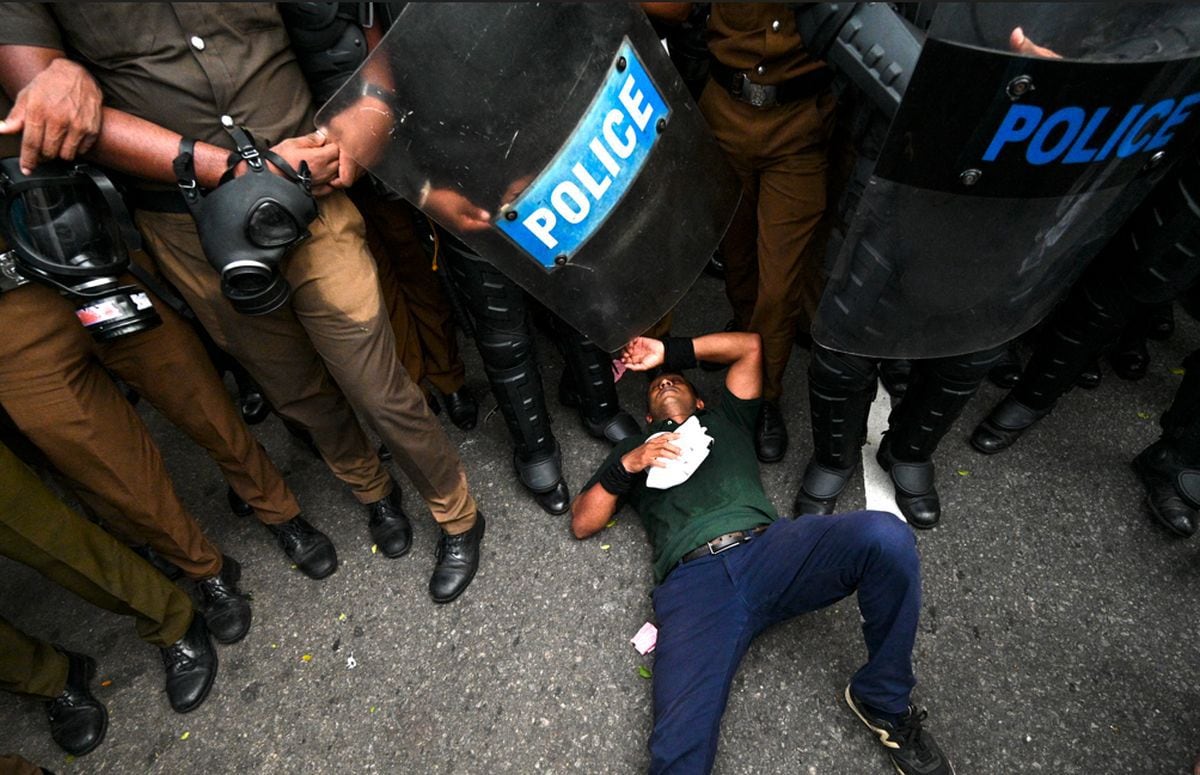The continuing economic crisis in Sri Lanka This Wednesday provoked new massive protests in the streets of Colombo with student movements, political parties and civil organizations expressing their discontent, reviving the scenes that months ago led the country to a civil revolt.
The demonstration called by different unions, student movements and political parties, including the main opposition party Samagi Jana Balawegaya (SJB), gathered thousands of people who marched in the west of the Sri Lankan capital.
Most of the participants in the march were young, some of them prepared with gas masks, bottles of water, and handkerchiefs, to protect themselves in case the public forces repressed the demonstration.
Others arrived without protection but claiming to be ready for attacks with water cannons and tear gas, shouting the slogan “Api baya na” (we are not afraid), in the face of a strong police deployment.
“What we ask for now is what we asked for at the beginning of the year, we need a change”, dI go to EFE joseph stalin, one of the organizers of the march and general secretary of the Teachers’ Union, referring to the wave of protests that the country experienced during the first semester and that ended with the resignation of the then Government.
Stalin, who was also one of the main leaders of those demonstrations and was later arrested for it, included among his demands the end of the repression of popular protest and the repeal of the Terrorism Prevention Law (PTA), used to detain some protesters.
“If the government does not stop the repression, then it will have to prepare for a new wave of protests”, Indian.
THE CRISIS
Data from the Central Bank of Sri Lanka maintains that the island’s inflation began to gradually decline for the first time since the economic crisis partially paralyzed the country a few months ago, however the cost of living continues to be the greatest motivation for citizens to express their discontent.
“We cannot continue living like this. Everything is expensive.” told EFE Rashmini Vuhanga22, who joined the march with her husband and baby.
Headline year-on-year inflation fell to 66 percent last month from 69.8 percent in September, and the cost of the food basket fell to 85.6 percent in October from 94.9 percent in September, a fact that is still unsustainable for families.
The island nation has been going through the worst economic crisis for a year since its independence from the British Empire in 1948, and added to the high inflation, the fall in international reserves, led the Government to declare the suspension of payments and to negotiate with the IMF a rescue plan that has not yet been produced.
This situation gave rise to protests throughout the island since the end of March, when thousands of people began to take to the streets to demand the resignation of the then president. Gotabaya Rajapaksa.
On July 9, the unrest culminated in the raid on Rajapaksa’s official residence and the private residence of the then prime minister. Ranil Wickremesingheforcing the president out of office and the country.
Wickremesinghe, now the country’s president, assured this week that the government’s goal is to reach an agreement with the IMF by January of next year.

“ECONOMIC TERRRORISM”
the official Premnath C. Dolawatte He described the protesters as “economic terrorists” for causing instability in the nation at a time when the government is trying to get the country afloat and regain the confidence of creditors and investors.
“This protest right now is unnecessary. What are you asking for? This protest is politically motivated.” he told EFE.
Several members of the Ceylon Chamber of Commerce also expressed concern about the protests. “which could undermine the efforts being made to resolve the current economic crisis”They indicated in a joint statement.
Source: Elcomercio
I, Ronald Payne, am a journalist and author who dedicated his life to telling the stories that need to be said. I have over 7 years of experience as a reporter and editor, covering everything from politics to business to crime.

:quality(75)/cloudfront-us-east-1.images.arcpublishing.com/elcomercio/L6AFM767LZFCZKLEWTUSC33CO4.jpg)


:quality(75)/cloudfront-us-east-1.images.arcpublishing.com/elcomercio/YS522KZFQNDPHNPY3WB47UWPH4.jpg)
:quality(75)/cloudfront-us-east-1.images.arcpublishing.com/elcomercio/I5U6ZNGSD5C2VDMQX6HBY6HHRM.jpg)
:quality(75)/cloudfront-us-east-1.images.arcpublishing.com/elcomercio/SQFAYOFLHJBC5OQ6Z3JX37YHT4.jpg)
